
Minsara Kanavu is a 1997 Indian Tamil-language musical romantic comedy film that was co-written and directed by Rajiv Menon. The film stars Arvind Swamy, Prabhu Deva, and Kajol in her Tamil debut, and revolves around Priya (Kajol), a convent student who wants to become a nun. Having returned to India from his studies overseas, Thomas (Swamy)—Priya's childhood friend—falls in love with her following their first meeting at her convent. With the help of hairstylist Deva, who is known for his ability to change woman's minds, Thomas tries to dissuade Priya from her ambition but Deva instead falls in love with her.

Mayabazar is a 1957 Indian epic Hindu mythological film directed by K. V. Reddy. It was produced by Nagi Reddi and Chakrapani under their banner, Vijaya Productions. The film was shot simultaneously in Telugu and Tamil, with a few differences in the cast. The story is an adaptation of the folk tale Sasirekha Parinayam, which is based on the characters of the epic Mahabharata. It revolves around the roles of Krishna and Ghatotkacha, as they try to reunite Arjuna's son Abhimanyu with his love, Balarama's daughter Sasirekha (Savitri). The Telugu version features Gummadi, Mukkamala, Ramana Reddy, and Relangi in supporting roles, with D. Balasubramaniam, R. Balasubramaniam, V. M. Ezhumalai, and K. A. Thangavelu playing those parts in the Tamil version.
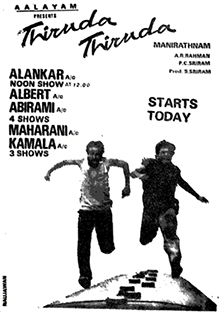
Thiruda Thiruda is a 1993 Indian Tamil-language black comedy caper film directed by Mani Ratnam written along with Ram Gopal Varma. The film stars Prashanth, Anand, Anu Aggarwal and Heera Rajagopal while S. P. Balasubrahmanyam and Salim Ghouse play supporting roles. The film's soundtrack and background score were composed by A. R. Rahman while the cinematography was handled by P. C. Sriram. In 1994, the film premièred at the Toronto International Film Festival. It also won the National Film Award for Best Special Effects.This is the one and only film that Anu Aggarwal has acted in Tamil.

Pulapaka Suseela is an Indian playback singer associated with the South Indian cinema primarily from Andhra Pradesh for over six decades and is referred to as Evergreen Nightingale of Indian cinema. She is one of the greatest and best-known playback singers in India. She has been recognized by the Guinness Book of World Records as well as by the Asia Book of Records for performing a record number of songs in different Indian languages. She is also the recipient of five National Film Award for Best Female Playback Singer and numerous state awards. Susheela is widely acclaimed as a singer who defined feminism in South Indian cinema and is well known for her mellifluous vocal performances for over 50,000 film and devotional songs across South Indian languages.
A. M. Rathnam is an Indian film producer, lyricist, screenwriter, and director known for his works in Telugu and Tamil cinema. Under the gamut of Sri Surya Movies Entertainment, Hyderabad, a movie production house owned by him, he has produced blockbusters in Telugu such as Karthavyam (1990), Peddarikam (1992), Sneham Kosam (1999), and Kushi (2001). He ventured into Tamil cinema in 1996 with the blockbuster Indian, which was India's Official Entry for the Best Foreign Language Film at the Academy Awards. He then produced films such as Kushi, Run, Boys, Enakku 20 Unakku 18, Dhool, Ghilli, 7G Rainbow Colony, Arrambam, Yennai Arindhaal and Vedalam.
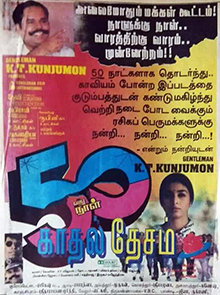
Kadhal Desam is a 1996 Indian Tamil-language romance film written and directed by Kathir and produced by K. T. Kunjumon. The film stars Tabu with Vineeth and Abbas in the main leads. This film marked Abbas's feature debut film and Tabu's Tamil debut film. The film stars with S. P. Balasubrahmanyam, Vadivelu, Chinni Jayanth, Srividya and others are featured in other pivotal characters. K. V. Anand was the cinematographer for the project and A. R. Rahman composed the film's soundtrack and score. The film was released in August 1996 and became a box office success.
Kadiri Venkata Reddy was an Indian film director, screenwriter, and producer who primarily worked in Telugu cinema. He is regarded as an influential director in South Indian cinema. He directed 14 feature films and won three National Film Awards and a Filmfare Award South.

Gurusala Krishnadas Venkatesh was an Indian film score composer who primarily worked in Kannada cinema during the 1960s, 1970s and until the late-1980s. He also composed music for Telugu, Malayalam and Tamil films. He produced numerous master pieces of Kannada film music and also brought in Western background score into Kannada films and scored music for all Bond movies of Rajkumar in the 1960s to 1970s.
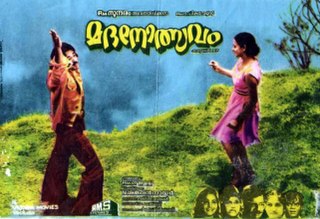
Madanolsavam is a 1978 Indian Malayalam-language romantic drama film written and directed by N. Sankaran Nair and starring Kamal Haasan, Jayan and Zarina Wahab. Dialogues and comedy scenes were written by Thoppil Bhasi. The film was partially remade in Telugu-language as Amara Prema by T. Rama Rao with Kamal and Zarina reprising their roles from the original. The film was dubbed into Tamil as Paruva Mazhai and into Hindi as Dil Ka Sathi Dil. The film is an unofficial remake of an English movie named Lovestory (1970).
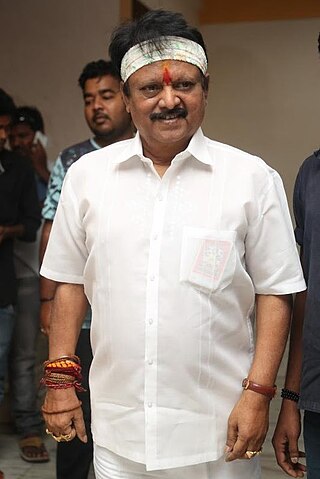
Kodi Ramakrishna was an Indian film director, screenwriter and actor. One of the most prolific directors of Telugu cinema, he directed over 100 feature films in a variety of genres. He is known as a celluloid visionary who introduced high-end visual effects to the South Indian film industry through his supernatural fantasy films. In 2012, he received the state Raghupathi Venkaiah Award for his lifetime contribution to Telugu cinema.
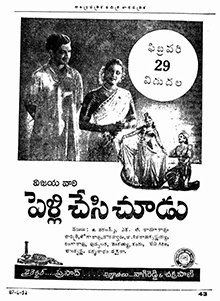
Pelli Chesi Choodu is a 1952 Indian satirical comedy film directed by L. V. Prasad and produced by Nagi Reddi and Chakrapani under their company Vijaya Productions. The film was made simultaneously in Telugu and Tamil, the latter titled Kalyanam Panni Paar. It stars N. T. Rama Rao, G. Varalakshmi, Yandamuri Joga Rao and Savitri. S. V. Ranga Rao, Sivarama Krishnayya, Doraswamy, and Suryakantham play supporting roles in the Telugu version while C. V. V. Panthulu replaced Krishnayya in Tamil.
Kutti Pisasu in Tamil, Bombat Car in Kannada and Cara Majaka in Telugu is a 2010 Indian multilingual fantasy film written and directed by Rama Narayanan, who returns after an eight year sabbatical. The film stars Baby Geethika, Ramji, Rajiv Kanakala, Silli Lalli Ravishankar, Sangeetha, and Ramya Krishnan, while Riyaz Khan, Shafi, Ganja Karuppu, and Nassar play supporting roles. Each version has a slightly different supporting cast. The Tamil version was dubbed in Hindi as Magic Robot and in Bengali as Robot - The Magic Car. The Tamil version was named after a song from Kaalai (2008), which also stars Sangeetha.

Sri Shirdi Saibaba Mahathyam is a 1986 Telugu-language hagiographical film written and directed by K. Vasu, based on the life of Sai Baba of Shirdi who has preached and practiced Religious humanism. Vijayachander portrayed the role of Baba. The film was a blockbuster and remained a cult classic. The film ran for 175 days in 12 centers, was screened at the International Film Festival of India and the Moscow Film Festival. The soundtrack was composed by Ilaiyaraaja, with lyrics written by Acharya Aatreya, and received wide appreciation. The film was dubbed into Hindi as Shirdi Sai Baba Ki Kahani and into Tamil as Sri Shirdi Saibaba.

Jeevitham is a 1950 Indian Telugu-language social guidance film produced by A. V. Meiyappan with his company AVM Productions and directed by M. V. Raman. The film stars Vyjayanthimala in her Telugu cinema debut with S. Varalakshmi, T. R. Ramachandran and C. H. Narayana Rao forming an ensemble cast, with many actors appearing in other significant roles. Actresses Lalitha and Padmini made guest appearances as stage dancers.

Sripathi Panditaradhyula Balasubrahmanyam, shortened as SPB, was an Indian playback singer, television presenter, actor, music composer, dubbing artist, and film producer. He is widely regarded as one of the greatest Indian singers of all time. He predominantly worked in Telugu, Tamil, Kannada, Malayalam, and Hindi films and sang in a total of 16 languages.
Khushbu Sundar, an Indian actress, has predominantly worked in Tamil language films, alongside Telugu, Malayalam, Kannada and Hindi language films. She has appeared in more than 185 films, with over 100 directly credited to Tamil cinema alone.

Annai Kaligambal is a 2003 Indian devotional film written and directed by Rama Narayanan. The film featured Ramya Krishnan in the title role alongside Anu Prabhakar and Livingston, while Jayanthi plays a supporting role. The film, which had music composed by Deva, released in January 2003. The film was simultaneously shot in Tamil and Kannada, with the latter titled as Shri Kalikamba, with Vinod Alva and Tennis Krishna replacing Livingston and Vennira Aadai Moorthy respectively. Kannada version was dubbed in Hindi as Maa Durga Divya Haathi and in Telugu as Allari Gajendrudu.

Kabali is the soundtrack album, composed by Santhosh Narayanan for the 2016 Indian Tamil-language action crime film of the same name written and directed by Pa. Ranjith and produced by Kalaipuli S. Thanu, starring Rajinikanth, Radhika Apte and Winston Chao. The soundtrack album featuring five songs with lyrics written by Kabilan, Vivek, Umadevi and Arunraja Kamaraj was released on 12 June 2016, at Chennai and was also released in Telugu, Hindi and Malay languages. Santhosh Narayanan won the Best Music Director Award at the 2017 Ananda Vikatan Cinema Awards. Initially, he was nominated for the Best Music Director – Tamil award at the 2017 Filmfare Awards South, along with Arunraja Kamaraj, for Best Lyricist – Tamil, Best Male Playback Singer – Tamil for the song "Neruppu Da". However, Shweta Mohan won the Filmfare Award for Best Female Playback Singer – Tamil for "Maya Nadhi".

M.S. Parthasarathy or M.S.P. Sarathi was an Indian film editor, director, and producer. He is nick named as "Japan" due to his hard working nature. He was closely associated with H.M. Reddy and worked numerous movies with him as an editor. He directed Telugu movie Errakota Veerudu (1973) with NT Rama Rao in the lead role. He edited Bhakta Kanakadasa (1960), with Dr. Rajkumar in the lead role which marked the official 100th film in Sandalwood (Kannada) film industry. He also edited Vaddante Dabbu with NT Rama Rao in the lead role.
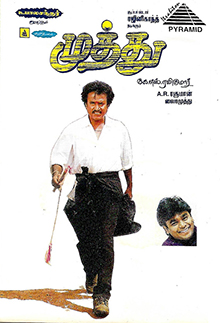
Muthu is the soundtrack album composed by A. R. Rahman for the 1995 Tamil-language film of the same name starring Rajinikanth and directed by K. S. Ravikumar. It is the first film where Rahman, Rajinikanth and Ravikumar worked together. The album have six tracks in each with lyrics with lyrics by Vairamuthu. The Hindi version is titled Muthu Maharaja and had lyrics penned by P. K. Mishra, whereas the Telugu version of Muthu is penned by Bhuvana Chandra. Recording of the songs took place at the composer's Panchathan Record Inn studio in Chennai. The soundtrack was released on 8 October 1995 under the Pyramid label. The Telugu version of the soundtrack was released under Aditya Music and Saregama distributed the Hindi soundtrack.
















